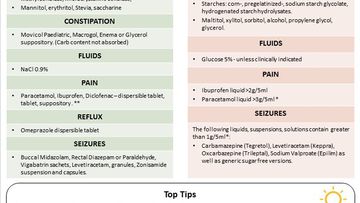Pharmacists Input in Managing Paediatric patients with Epilepsy on the Ketogenic Diet
Poster
St Georges is 1 of 15 NHS Trusts that initiates and monitors children on the ketogenic diet. The ketogenic diet is an effective nonpharmacologic treatment for intractable childhood epilepsy (1). It consists of high fat, low carbohydrate, and moderate protein. For a ketogenic diet to be effective, a strict control of carbohydrate intake is important. Reduction of seizures depends on ketosis. Blood ketone levels are monitored twice daily throughout the diet to determine whether ketosis have been achieved. Accepted levels are 3-6 mmol/L.
Therefore, these children are allowed 5-15g carbohydrates per day. Careful consideration of carbohydrate content and drug formulation of medications is vital while on the diet. To execute the diet successfully, a multidisciplinary team is required. Pharmacists plays and integral role in minimising amount of carbohydrate in medicines and recommending the use of low/ no carbohydrate preparations where appropriate.
AIMS
Create a reference list of medication stating manufacturer, brand and carbohydrate content that are prescribed for these paediatric patients.
Deliver a presentation on this topic to other paediatric pharmacists in the department to raise awareness of the diet.
Review prescriptions of these patients when they are admitted and make suitable interventions and recommendations.
Design a visual aid to help other health care professionals understand which carbohydrates are suitable or unsuitable.
METHOD
Matthews Friends – Carbohydrate content of medication list was used to determine carbohydrate content of known brands. Manufactures where contacted or Summary of product characteristics (SmPC) were used to determine carbohydrate contents of generic brands which are currently used in our Trust.
A presentation and was delivered at our local paediatric weekly teaching sessions at St. George’s.
Prescriptions were analysed retrospectively, and interventions were made where appropriate.
A visual aid (Fig1) was design to help the MDT with identifying high and low carbohydrate medications. To help make everyone aware what is suitable/ not suitable.
RESULTS
A total of 40 extra medications were added to the list, which are currently used in the Trust. These included antibiotics, antiepileptic and other miscellaneous medications.
The presentation went well, and the group didn’t know much about the pharmacist’s involvement in the treatment of epilepsy with the Ketogenic Diet.
7 patients were admitted from May 2021-July 2021. 4 were initiated on the ketogenic diet. The other 3 were admitted due to acute illness/planned admission. Median age for ketogenic initiation was 22 months.
223 medications were concurrently prescribed for 7 patients.
The overall content of 23 prescriptions were over 1g/ day.
These liquids had the highest carbohydrate content >3g /5ml: Carbamazepine, Ibuprofen, Levetiracetam, Paracetamol.
Eg, A patient was allowed 8.5g of carbohydrates/ day and received 4 doses paracetamol liquid with a content of 21g/day.
Pharmacists made a minimum of 16 interventions.
CONCLUSION
Patients are only allowed a moderate amount of carbohydrates on this diet. Paediatric patients often require liquid preparations which accounts for most carbohydrates. The pharmacist’s input is important in determining the composition of drug excipients, and therefore quantify unsuitable excipients. Pharmacists should review patients’ medication and provide guidance to the MDT in terms of formulating a treatment plan to adhere to the diet restrictions and educate care givers on the medication ingredients to avoid.
An up-to-date list should be kept to minimise time spent on researching carbohydrate content of medication. This can be quite challenging when the Trust receives different generic brands. Most patients stay for less than a week. Only 1 patient stayed for 2 months and most of the interventions were made for this patient.
The visual aid is a valuable resource to use to answer questions about drug use during ketogenic diet. It provides unsuitable excipients and offers alternatives and is easy to interpret.
More Neuropharmacy Academy Comprehensive care Projects

Developing neuropharmacists, supporting collaborative care
Knowledgeable pharmacists can initiate or support new treatment pathways, play an important role in patient education, medicine adherence, efficacy and safety, and provide advice to other healthcare professionals involved in the person's care. This Academy recognises the value of this essential role, and seeks to enhance pharmacist's clinical skills and build their confidence in managing a range of neurological conditions.